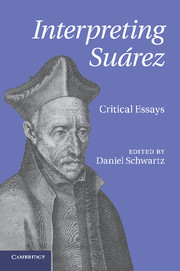Book contents
- Frontmatter
- Contents
- Notes on contributors
- Acknowledgements
- Abbreviations and method of citation
- Chapter 1 Introduction
- Chapter 2 Fundamentals in Suárez's metaphysics: transcendentals and categories
- Chapter 3 The reality of substantial form: Suárez, Metaphysical Disputations xv
- Chapter 4 Suárez on the ontology of relations
- Chapter 5 Suárez's cosmological argument for the existence of God
- Chapter 6 Action and freedom in Suárez's ethics
- Chapter 7 Obligation, rightness, and natural law: Suárez and some critics
- Chapter 8 Suárez on distributive justice
- Chapter 9 Suárez on just war
- Bibliography
- Index
Chapter 9 - Suárez on just war
Published online by Cambridge University Press: 05 December 2011
- Frontmatter
- Contents
- Notes on contributors
- Acknowledgements
- Abbreviations and method of citation
- Chapter 1 Introduction
- Chapter 2 Fundamentals in Suárez's metaphysics: transcendentals and categories
- Chapter 3 The reality of substantial form: Suárez, Metaphysical Disputations xv
- Chapter 4 Suárez on the ontology of relations
- Chapter 5 Suárez's cosmological argument for the existence of God
- Chapter 6 Action and freedom in Suárez's ethics
- Chapter 7 Obligation, rightness, and natural law: Suárez and some critics
- Chapter 8 Suárez on distributive justice
- Chapter 9 Suárez on just war
- Bibliography
- Index
Summary
In the pantheon of scholastic just war theorists, a trio stand out: Aquinas, Vitoria, and Suárez. Of the three, Suárez was by far the most systematic in his treatment of issues relating to war. Unlike Vitoria, who framed his De Indis in relation to the social and political events of his day, Suárez favoured a more abstract and speculative style. And while he found constant points of reference in Aquinas's short Quaestio de bello, his considerably more detailed account moved the saint's principles in novel directions, often as read through the lens of Cajetan's commentary, and sometimes in disagreement with the path marked out earlier by Vitoria.
Suárez's Disputatio de bello (DDB) is part of a larger work on the theological virtues of faith, hope, and charity. He followed Aquinas in placing the discussion of war within the context of the last-mentioned virtue. Whereas his predecessors Cajetan and Vitoria evinced little interest in developing the link of just war with charity, prioritizing justice instead, Suárez took care to illustrate the salience of this connection. This did not, however, prevent him from also highlighting the exigencies of justice. His coordination of the two virtues, the one theological and the other cardinal, within his account of just war, represented a distinctive contribution to scholastic thought in this domain.
- Type
- Chapter
- Information
- Interpreting SuárezCritical Essays, pp. 185 - 204Publisher: Cambridge University PressPrint publication year: 2011
- 2
- Cited by

